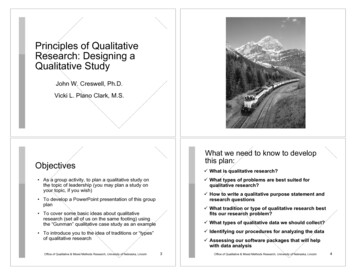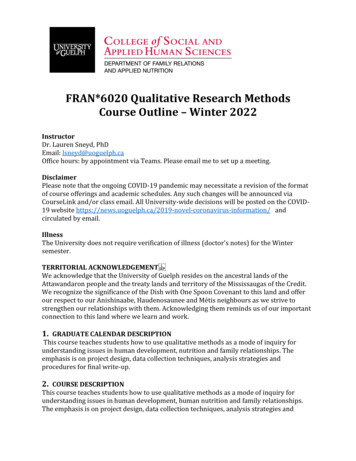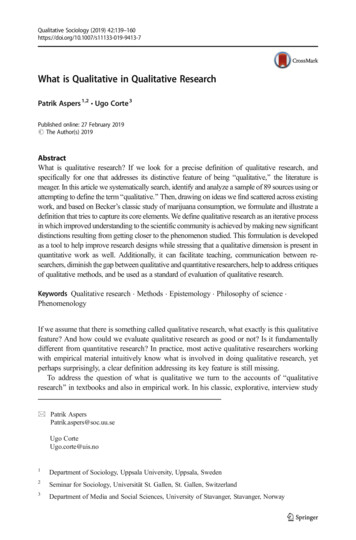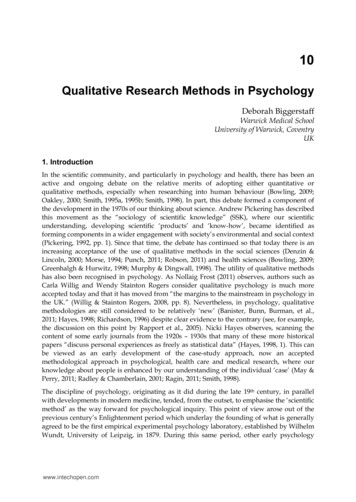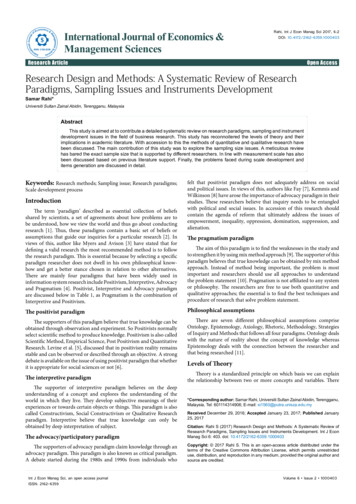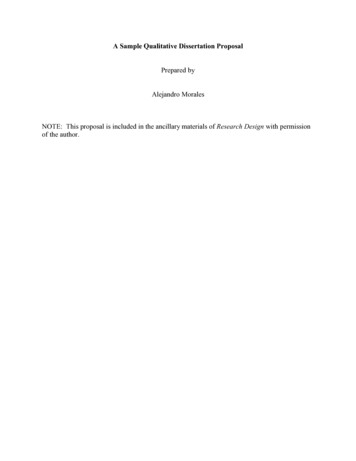
Transcription
INTRODUCTION TOQUALITATIVE METHODSIN PSYCHOLOGYDennis HowittLoughborough University
Pearson Education LimitedEdinburgh GateHarlowEssex CM20 2JEEnglandand Associated Companies throughout the worldVisit us on the World Wide Web at:www.pearsoned.co.ukFirst published 2010Second edition published 2010 Pearson Education Limited 2010The right of Dennis Howitt to be identified as author of this work has beenasserted by him in accordance with the Copyright, Designs and Patens Act 1988.All rights reserved. No part of this publication may be reproduced, stored in a retrievalsystem, or transmitted in any from or by any means, electronic, mechanical, photocopying,recording or otherwise, without either the prior written permission of the publisheror a licence permitting restricted copying in the United Kingdom issued by theCopyright Licensing Agency Ltd, Saffron House, 6–10 Kirby Street, London EC1N 8TS.All trademarks used herein are the property of their respective owners. The use of anytrademark in this text does not vest in the author or publisher any trademark ownershiprights in such trademarks, nor does the use of such trademarks imply any affiliation withor endorsement of this book by such owners.ISBN: 978-0-13-206874-1British Library Cataloguing-in-Publication DataA catalogue record for this book is available from the British LibraryLibrary of Congress Cataloging-in-Publication Data [delete this if CIP data has not been applied for][insert book block when received form LoC]10 9 8 7 6 5 4 3 2 114 13 12 11 10Typeset in 10/12.5pt Sabon by 35Printed by Ashford Colour Press Ltd., Gosport, UKThe publisher’s policy is to use paper manufactured from sustainable forests.
BRIEF CONTENTSContentsGuided tour of the bookPrefaceAcknowledgementsPart 1 Background to qualitative methods in psychology12What is qualitative research in psychology and was it really hidden?How qualitative methods developed in psychologyPart 2 Qualitative data collection345viixiixivxviii152855Qualitative interviewingFocus groupsEthnography/participant observation5789111Part 3 Qualitative data analysis1356789101112Data transcription methodsThematic analysisQualitative data analysis: Grounded theory developmentDiscourse analysisConversation analysisInterpretative phenomenological analysis (IPA)Narrative analysisPart 4 Planning and writing up qualitative data research131415139163187215244271296321Writing a qualitative reportEnsuring quality in qualitative researchEthics and data management in qualitative research323356382GlossaryReferencesIndex411432450
CONTENTSGuided tour of the bookPrefaceAcknowledgementsPart 1 Background to qualitative methods in psychology1What is qualitative research in psychology and was it really hidden?OverviewWhat is qualitative research?Science as normal practice in qualitative and quantitative researchThe beginnings of modern psychology: introspectionismThe logical positivists, behaviourism and psychologyThe quantitative dominance of mainstream psychologyStatistics and the quantitative ethos in psychologyConclusionKey pointsAdditional resources2How qualitative methods developed in psychologyOverviewDocumenting the growth of qualitative methods in psychologyThe main qualitative methods in psychology up to the 1950sThe radical innovations of 1950–1970The recent history of qualitative psychologyConclusionKey pointsAdditional resourcesPart 2 Qualitative data collection3Qualitative interviewingOverviewWhat is qualitative interviewing?The development of qualitative interviewingHow to conduct qualitative interviewsHow to analyse a qualitative interviewWhen to use qualitative 2495153545557575862648183
viiiCONTENTSEvaluation of qualitative interviewingConclusionKey pointsAdditional resources4Focus groupsOverviewWhat are focus groups?The development of focus groupsHow to conduct focus groupsHow to analyse data from focus groupsWhen to use focus groupsEvaluation of focus groupsConclusionKey pointsAdditional resources5Ethnography/participant observationOverviewWhat is ethnography/participant observation?The development of ethnography/participant observationHow to conduct ethnography/participant observationHow to analyse ethnography/participant observationWhen to use ethnography/participant observationEvaluation of ethnography/participant observationConclusionKey pointsAdditional resourcesPart 3 Qualitative data analysis6Data transcription methodsOverviewWhat is transcription?The development of transcriptionHow to do Jefferson transcriptionWhen to use Jefferson transcriptionEvaluation of Jefferson transcriptionConclusionKey pointsAdditional 58159161162
CONTENTS7Thematic analysisOverviewWhat is thematic analysis?The development of thematic analysisHow to do thematic analysisWhen to use thematic analysisEvaluation of thematic analysisConclusionKey pointsAdditional resources8Qualitative data analysis: Grounded theory developmentOverviewWhat is grounded theory?The development of grounded theoryHow to do grounded theoryWhen to use grounded theoryEvaluation of grounded theoryConclusionKey pointsAdditional resources9Discourse analysisOverviewWhat is discourse analysis?The development of discourse analysisHow to do discourse analysisWhen to use discourse analysisEvaluation of discourse analysisConclusionKey pointsAdditional resources10Conversation analysisOverviewWhat is conversation analysis?The development of conversation analysisHow to do conversation analysisWhen to use conversation analysisEvaluation of conversation analysisConclusionKey pointsAdditional 44244245253255267268269270270ix
xCONTENTS11Interpretative phenomenological analysis (IPA)OverviewWhat is interpretative phenomenological analysis?The development of interpretative phenomenological analysisHow to do interpretative phenomenological analysisWhen to use interpretative phenomenological analysisEvaluation of interpretative phenomenological analysisConclusionKey pointsAdditional resources12Narrative analysisOverviewWhat is narrative analysis?The development of narrative analysisHow to do narrative analysisWhen to use narrative analysisEvaluation of narrative analysisConclusionKey pointsAdditional resourcesPart 4 Planning and writing up qualitative data research1314Writing a qualitative 6316317318320320321OverviewIs a qualitative research report different?Where to aim: the overall characteristics of a good qualitative reportThe qualitative ethosThe structure of a qualitative reportThe qualitative report in detailConclusionKey pointsAdditional resources323323325327328331335354355355Ensuring quality in qualitative researchOverviewHow should qualitative research be evaluated?Some quality criteria for quantitative researchEvaluating quality in qualitative researchGeneral academic justification and features of the researchValidity in qualitative research356356357360360362366
CONTENTS15Reliability in qualitative researchConclusionKey pointsAdditional resources379380381381Ethics and data management in qualitative researchOverviewDoes qualitative research need ethics?The development of ethics in psychologyGeneral ethical principles for qualitative researchEthical procedures in qualitative researchDebriefing as ethics and methodologyThe ethics of report writing and publicationConclusionKey pointsAdditional ReferencesIndex411432450xi
PREFACEIn psychology, the received understanding holds that qualitative methods haveemerged in force during the last three decades. Before this time, mainstreampsychology was a quantitative monolith smothering any other perspective onwhat psychology should be. This is not entirely a fiction but it is a creation mythrather than a precise and historical accurate account of the dark days beforequalitative psychology. Probably my experience is a little different from that ofmost psychologists. At the end of my first year as a psychology student, alongwith my peers, I was sent for six months to the factory floor (and eventually thepersonnel offices) of Morganite Carbon which was then in Battersea, London.The reason? Essentially to experience life as a factory worker and to write a project on my experiences. In other words, participant observation or ethnography– and the experience of real life. At the end of every couple of terms we weresent to other locations. I spent six months at the prison in Wakefield and anothersix months at St George’s Hospital, London. At Wakefield, I did my first studyof sex offenders (possibly the first ever study by a psychologist of sex offendersin the United Kingdom). This was an interest which was to resurface years laterwith my studies of sexual abuse and paedophiles. At St George’s Hospitalmy colleagues included Fay Fransella an important figure in the field of GeorgeKelly’s personal construct theory – an early precursor of social constructionistapproaches in qualitative psychology. Indeed, I attended the first conference onpersonal construct theory while at Brunel University and, I am assured thoughcannot vouchsafe it, so was in the presence of George Kelly himself. Actuallywe got rather a lot of personal construct theory.At Brunel, I remember being fascinated by the sessions on psychoanalysisgiven to us by Professor Elliot Jacques. Not only was Jacques famous at the timeas an organisational psychologist bringing psychoanalytic ideas to industrybut he was the originator of the concept of the midlife crisis! However, thekey influence on any psychology student who studied at Brunel Universityat that time was Marie Jahoda. Ideas and questions where what counted forMarie Jahoda. She had worked with or knew anyone who was important in thesocial sciences at large. Sigmund Freud was a friend of her family. She wouldspeak of ‘Robert’ in lectures – this was Robert Merton, the great theorist ofsociology. She had worked with and had been married to Paul Lazarsfeld, thegreat methodologist of sociology. And she had been involved in some of themost innovatory research in psychology – the Marienthal unemployment study.The ‘problem’ – meaning the intellectual task – was key to doing research. Theways of collecting data merely followed they did not lead; analysis was a wayof life.I have never worked in the environment with just a single academic discipline– always there have been sociologists, psychologists and smattering of others.My first academic job ever was at the Centre for Mass Communications Researchat the University of Leicester. Now it is remarkable just how important the fieldof mass communications research has been in the development of qualitativeresearch methods. For example, the focus group, participant observation, audience
PREFACExvstudies, narrative/life histories and so forth either began in that field or weresubstantially advanced by it. More than anything, it was a field where psychologists and sociologists collectively contributed. Of course, the styles of researchvaried from the deeply quantitative to the equally deeply qualitative. Differentproblems called for different methods. I also remember some radical figuressuch as Aaron Cicourel, a cognitive sociologist influenced by Erving Goffmanand Harold Garfinkel, visiting. Cicourel was a pioneer in the use of video inhis research. During a seminar in which he agonised over the issues of codingand categorisation I remember asking Cicourel why he did not simply publishhis videotapes. There was a several seconds delay but eventually the reply came.But ethnographic methods are the methods of ordinary people so why botherwith the researcher?Paradoxically, I have always been involved in teaching quantitative methods– I was paid to do so as a postgraduate and from then on. Nevertheless, inacademic life you are what you teach for some curious reason. The oppositionof qualitative and quantative is not inevitable; many researchers do both. AaronCicourel went along a similar route:I am NOT opposed to quantification or formalization or modeling, but donot want to pursue quantitative methods that are not commensurate withthe research phenomena addressed. (Cicourel interviewed by Andreas Witzeland Günter Mey, 2004, p. 1)He spent a lot of time as a postgraduate student learning mathematics andquantitative methods:. . . if I criticized such methods, I would have to show that my concernabout their use was not based on an inability to know and use them, butwas due to a genuine interest in finding methods that were congruent orin correspondence with the phenomena we call social interaction and theethnographic conditions associated with routine language use in informaland formal everyday life settings. (Witzel and Mey, 2004, p. 1)There is another reason which Cicourel overlooks. Quantitative methods canhave a compelling effect of government and general social policy. Being ableto speak and write on equal terms with quantitative researchers is importantin policy areas of the sort that my research was based.By concentrating on the problem, rather than the method, a researchermakes choices which are more to do with getting the best possible answer tothe question than getting a particular sort of answer to the question. For thatreason, qualitative approaches are just part of my research. However, wherethe question demands contextualised, detailed data then the method becamejust me, my participants and my recording machine. Some of my favouritesamong my own research research involved just these.Qualitative methods in psychology are becoming diverse. Nevertheless, thereis not quite the spread of different styles of research or epistemologies for researchthat one finds in other disciplines. Ethnographic methods, for example, havenot been common in the history of psychology – a situation which persiststo date. But discourse analytic approaches, in contrast, have become relativelycommon. I would not encourage any researcher in either of these directionsunless their research problem is likely to be best answered by either of these.This may not please all qualitative researchers but any hegemony in terms ofmethod in psychology to my mind has to be a retrograde step. So this book
xviPREFACEtakes a broad-brush approach to qualitative methods in psychology. First of all,it invites readers to understand better qualitative data collection methods. Theseare seriously difficult ways of collecting data if properly considered and thereis little excuse ever for sloppy and inappropriate data collection methods. Theyare simply counterproductive. It is all too easy to take the view that an in-depthinterview or a focus group is an easy approach to data collection simply becausethey might appear to involve little other than conversational skills. But one hasonly to look at some of the transcripts of such data published in journal articlesto realise that the researcher has not put on a skilled performance. It needs time,practice, discussion and training to do qualitative data collection well. Secondly,I have covered some very different forms of qualitative data analysis methodsin this book. These are not all mutually compatible approaches in every respect.Their roots lie in very different spheres. Grounded theory derives from thesociology of the 1960s as does conversation analysis. Discourse analysis, hasits roots in the ideas of the French philosopher Michel Foucault but also in thesociology of science of the 1970s. Interpretative phenomenological analysisis dependent on phenomenology with its roots in philosophy and psychology.Narrative analysis has a multitude of roots but primarily in the narrativepsychology of the 1990s. And thematic analysis? Well – it all depends whatyou mean by thematic analysis as we shall see.There is an important issue to raise. Perhaps it is best raised by quotingfrom Kenneth J. Gergen, one of the key, original figures in the move towardsqualitative methods in psychology. In the following he describes his earlyexperience as a psychological researcher:My early training was in scientific psychology, that is, a psychology basedon the promise that through the application of empirical methods, soundmeasures, and statistical analysis we would begin to approach the truth ofmental functioning . . . I learned my lessons well, how to produce from themessy confines of laboratory life the kinds of clear and compelling ‘facts’acceptable to the professional journals. A few tricks of the trade: pre-test theexperimental manipulations so to ensure that the desired effects are obtained;use multiple measures to so ensure that at least one will demonstrate theeffects; if the first statistical test doesn’t yield a reliable difference, try othersthat will; if there are subjects who dramatically contradict the desired effect,even the smallest effect can reach significance; be sure to cite early researchto express historical depth; cite recent research to demonstrate ‘up-to-date’knowledge; do not cite Freud, Jung or any other ‘pre-scientific’ psychologist;cite the research of scientists who are supported by the findings as theyare likely to be asked for evaluations by the journal. Nor was it simply thatmastering the craft of research management allowed me to ‘generate facts’in the scientific journals; success also meant research grants, reputation, andhigher status jobs. (Gergen, 1999, p. 58)Quite what Gergen hoped to achieve by this ‘confession’ is difficult to fathom.As a joking pastiche of mainstream psychology it fails to amuse. In writingthis book, I hope to share some of the very positive things that qualitativepsychologists can achieve and important ideas which can inform the researchof all psychologists irrespective of their point of balance on the qualitative–quantitative dimension. Making research better, then, is an important objectiveof this book – deriding the work of researchers struggling as we all do to understand the world they live in is not on my agenda. Research is about knowing
PREFACExviiin the best way possible – which is not an issue of the general superiority ofone method over others.This book has a modular structure. It is not designed to be read cover tocover but, instead, it can be used as a resource and read in any order as needdemands. To this end, the following pedagogic features should be noted: There is a glossary covering both the key terms in qualitative analysis in thisbook and the field of qualitative research in general. Most of the chapters have a common structure wherever possible. So thedata collection methods chapters have a common structure and the dataanalysis chapters have a common structure. Material is carefully organised in sections permitting unwanted sections tobe ignored perhaps to be read some time later. Each chapter includes a variety of boxes in which key concepts are discussed,examples of relevant studies described, and special topics introduced. Each chapter begins with a summary of the major points in the chapter. Each chapter ends with recommended resources for further study includingbooks, journal articles and web pages as appropriate.Dennis HowittSeptember 2009
PART 1Background toqualitative methodsin psychologyQualitative methods may seem to be relatively new in psychology but theyhave a deep, complex history both in psychology and, importantly, in otherdisciplines. While it is possible to claim that the growth spurt of the embryoqualitative psychology can be clearly seen to have its origins in the 1980s,a qualitative tradition can be identified which harks back to the beginningsof modern psychology in the late nineteenth century and no doubt earlier.The scope of qualitative methods in psychology is quite broad and a rangeof intellectual traditions in psychology and other disciplines have madesubstantial contribution to the field. Thus there is a richness in the historyof qualitative methods in psychology which belies many descriptions of thehistory of psychology and which should be appreciated by any researcherwishing to understand this expanding field. Of course, qualitative psychologyis different from quantitative psychology in endless ways and any researchertrained on a purely quantitative diet typical of many psychologists mayexperience something of a culture shock. This does not mean that theywill hate and loathe qualitative psychology – merely that it may appear alienand different, though perhaps whetting the appetite for new challenges.After all, the philosophical foundations of qualitative psychology are verydifferent from those of quantitative psychology, and its methodologicalfoundations are in many ways the reverse of the dominant approachesof mainstream psychology. The procedures for data analysis in qualitativepsychology involve an intimacy of working with the data which those usedto conventional quantitative analysis involving statistical methods may finddisconcerting.
2PART 1 BACKGROUND TO QUALITATIVE METHODS IN PSYCHOLOGYThe two chapters which constitute Part 1 of this book involve someembedded objectives: To provide a broad understanding of how qualitative psychology differsfrom quantitative psychology. To provide a review of the psychology which explains just why qualitativemethods were so slow in emerging in psychology compared to relateddisciplines. To provide a picture of the development of qualitative psychology fromwithin the discipline, under the influence of related disciplines such associology and, as a consequence, of some of the disillusionment with themethods of mainstream psychology.There is no comprehensive history of qualitative research in psychology.The references to the history of qualitative psychology tend to be brief and,if not mistaken, suggest that mainstream psychology essentially smotheredqualitative psychology in the antagonist philosophy of positivism. Positivismis essentially a description of the assumptions and characteristics of sciencessuch as physics and chemistry. For example, they are characterised by thesearch for universal laws, quantification and empirical investigation. It isclaimed by qualitative researchers and others that psychology adoptedthis approach to its detriment. There are doubts that qualitative psychologywas anathema to positivism though claims which are made frequently tendeventually to be believed. What seems clear is that the majority of psychologists in the early history of modern psychology tend to adopt workingpractices which were not conducive to the ideas of qualitative psychology.Where did these research practices come from? They seem to have originatedin attempts by psychologists to emulate the working practices of the naturalsciences. Amongst these, especially physics had had spectacular successesin the nineteenth century. Practices such as experimentation, measurement,reductionist thinking and so forth are all fundamental influences of thenatural sciences on early psychological researchers. The problem was notjust one for psychology and one should remember qualitative methods werealso fairly poorly developed in related disciplines such as sociology in thenineteenth and early twentieth centuries. It was not until the 1950s and 1960sthat qualitative methods began to develop as an effective challenge toquantitative methods and grand theory in sociology. Thus it is not absolutelycorrect to suggest that distinctive features of the discipline of psychologywere responsible for the late emergence of qualitative psychology. For somereason, though, qualitative psychology emerged two or three decades laterthan did the qualitative tradition in sociology, though both disciplines were,of course, subject to many of the same influences.The idea of qualitative psychology eventually defeating the dragon ofpositivism is a heroic view on the history of qualitative psychology but essentially a false one. We shall see that positivism did dominate the early period
CHAPTER 1 WHAT IS QUALITATIVE RESEARCH IN PSYCHOLOGY AND WAS IT REALLY HIDDEN?3of modern psychology but not to the exclusion of quite different approaches.Positivism and qualitative psychology are not entirely incompatible – ifone understands quite what positivism assumes and something aboutwhat qualitative methods do. Pinning the blame for the late emergence ofqualitative psychology on positivism amounts to a ‘creation myth’ ratherthan an explanation. Positivism was not seen as applying to every academicdiscipline or aspects thereof. The ideas of positivism really only apply tothe physical sciences though there is plenty of evidence that psychologiststhought that it applied to psychology itself. This is, then, not attributableto positivism but to practitioners’ erroneous ideas about positivism. Itwould be something of a shame if qualitative researchers – who arguablyhave and need a relatively subtle understanding of the philosophical underpinnings of their chosen approach – propagate erroneous versions of thehistory of psychology themselves. It is probable that the ‘received’ visionof the nature of psychological research was responsible for the relativeneglect of qualitative methods in psychology. Furthermore, the successof the quantitative version of psychology should not be overlooked. Tobe sure, qualitative researchers have numerous cogent criticisms of mainstream psychology. But these do not take away the influential position,if not power, achieved by psychology during the twentieth century andstill today compared with many other disciplines. Thus psychology is aprofession in the fullest meaning of the word whereas this is nowhere nearso clear for related disciplines such as sociology and social anthropology.This is a plea for clarity about the history of psychology as well as onefor understanding of the influence of other social scientific disciplines onthe development of qualitative psychology. Quantitative research providedan effective and rewarding model for psychologists during the twentiethcentury which was not emulated in the same way or to anywhere the samedegree of success in other disciplines.Finally, we read history with hindsight and from a current perspective. Itis impossible – albeit desirable – to understand history as it was experienced.One can’t, and to attempt to do so is a fruitless endeavour. But simplethings might help provide a more acceptable rounded understanding of thedevelopment of qualitative methods. The numbers of psychology studentsgraduating today are massive compared with the early days of the discipline.This means that part of the reason for the late development of qualitativepsychology may be due to the limited numbers of personnel. Other fieldsof psychology, besides qualitative methods, began to flourish in the 1980sand 1990s – these include decidedly non-qualitative sub-fields of psychologysuch as forensic, health and counselling psychology. Forensic psychologyhad lain largely dormant from the early 1900s only to begin to prosper in the1980s – just when qualitative psychology emerged. The point is, of course,that as psychology approached a critical mass it achieved more potentialto embrace a wider variety of interests. Indeed, some might say that thecritical mass encouraged these changes. For much of its history as embraced
4PART 1 BACKGROUND TO QUALITATIVE METHODS IN PSYCHOLOGYin the first two chapters of this book, psychology as a discipline would onlyhave been able to muster in total the numbers who devote themselves tothese recent specialized interests in psychology.Chapter 1 concentrates on two things: Describing the essential characteristics of qualitative methods inpsychology. Discussing the origins of quantification in psychology, including statisticalthinking.The chapter demonstrates something of the subtlety of the philosophicalunderpinnings of the quantitative–qualitative debate.Chapter 2 looks at the varied contributions that psychologists have madethroughout the history of psychology which are essentially qualitative innature and tries to explain the roots of these approaches in psychology andrelated disciplines. The following seem clear: Qualitative approaches have been part of psychology throughout itsmodern history. Many of the early examples of qualitative research in psychology havebecome ‘classics’ but it is hard to find a clear legacy of them in the historyof modern psychology. Most of the early examples of qualitative research in psychology involvedistinctly qualitative data collection methods although distinct and frequently used methods of qualitative data analysis did not really emergeuntil the 1950s and 1960s in related disciplines and, probably, not untilthe 1980s in psychology. Qualitative psychology has developed a basis in the institutions ofpsychology (learned societies, conferences, specialised journals, etc.)which largely eluded it in its early history.
CHAPTER 1What is qualitativeresearch inpsychology andwas it reallyhidden?Overview Qualitative research in psychology is rapidly emerging as an important focus forpsychological research and theory. Although there is a long history of qualitativemethods in psychology, it is only since the 1980s that qualitative methodshave made significant inroads. Among the distinguishing features of qualitativeresearch are its preference for data rich in description, the belief that realityis constructed socially, and that reality is about interpretation and not abouthypothesis testing, for example. Psychology has historically constructed itself as being a science but, then, largelyidentified the characteristics of science in terms of numbers and quantificationwhich are not essential features of science. Positivism has frequently been blamed for the distorted nature of psychology’sconception of science. This, however, tends to overlook that both Comte’spositivism and lo
1 What is qualitative research in psychology and was it really hidden? 5 2 How qualitative methods developed in psychology 28 . 6 Data transcription methods 139 7 Thematic analysis 163 8 Qualitative data analysis: Grounded theory development 187 9 Discourse analysis 215 10 Conversation analysis 244 11 Interpretative phenomenological analysis .
